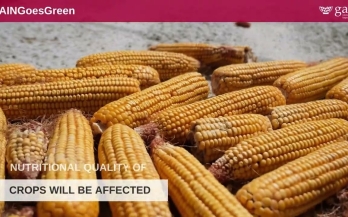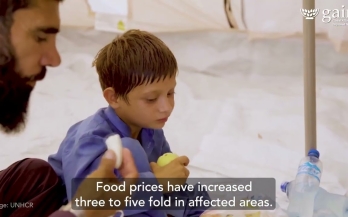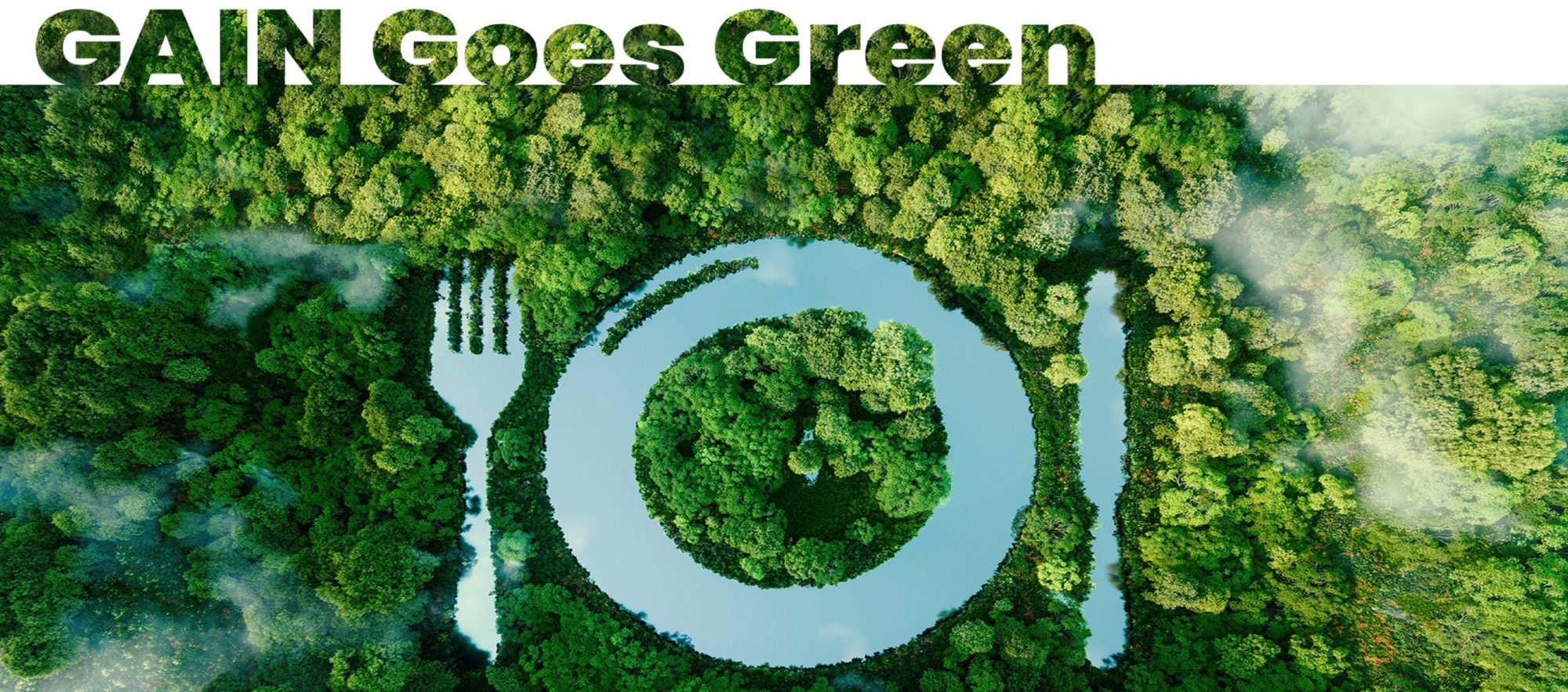What is GAIN doing at COP27?
In line with our Environment Strategy, we aim to do the following at COP27:
- Highlight the need for coordinated and integrated action on climate and nutrition to prevent disastrous increases in food insecurity and malnutrition resulting from climate change
- Support and contribute towards partnerships which support food systems transformation for nutrition and climate
- Call for governments, businesses, NGOs, and consumers to take action to advance both nutrition and climate goals in several key areas including:
- Developing integrated approaches to food, nutrition, and climate policymaking, for example by incorporating diets and consumption into NDCs
- Reducing food loss and waste to increase the consumption of nutritious foods and decrease their emissions
- Promoting a healthy and sustainable diet, accounting for the needs of consumers in low- and middle-income countries
- Investing in adaptation measures to diversify the foods we consume and scale-up the use of resilient and biofortified crops
- Financing SMEs to improve their ability to provide nutritious and sustainable food to consumers in low- and middle-income countries
Key GAIN Events
The critical role of SMEs in delivering nutrition
8th November 12:00 - 12:45 EET, Food Systems Pavilion
YouTube link for streaming available here
This event will highlight the role of SMEs as innovators to contribute to availability of safe nutritious fresh and processed foods, localised diet diversification, healthy diets accessibility, and food sovereignty.
‘Climate and Nutrition: we can’t have one without the other: a call to action for policy makers’
8th November 13:00 – 13:45 EET, Food Systems Pavilion
YouTube link for streaming available here
Climate change will continue to present a major threat to nutrition and food security beyond the current crisis, yet when decision makers talk about climate, nutrition is often forgotten. This event is a call to action for the climate community to put nutrition at the heart of all action, including in NDCs.
Building Climate Resilience of Food Systems in Bangladesh
10th November 11:00 - 12:30 EET, Bangladesh Pavilion
Highlighting the Honourable Prime Minister of the Government of the People’s Republic of Bangladesh commitments made during UN Food Systems Summit (UNFSS), COP26 and Nutrition for Growth Summit (N4G), the Government of Bangladesh (GOB) on progress in developing integrated food systems policies and national priorities to address climate change, food security and nutrition
True Value of Food: A call to action to solve climate change and other global crises
10th November 15:00 - 16:45 EET, Food Systems Pavilion
YouTube link for streaming available here
Transforming food systems is critical to address climate change and other global crises. At this event, the True Value of Food Initiative – launched at the United Nations Food Systems Summit and allied to the UN Food Systems Coordination Hub – will announce a Call to Action to governments across the globe to make healthy, sustainable, affordable food the new normal by committing to increasing the True Value of Food.
True Value of Food: A Call to Action to Solve the Climate Crisis will feature international experts sharing strategies for governments to effectively address climate change and other global challenges by creating food systems that deliver affordable, sustainable, healthy, and fairly produced food to its citizens. This food systems transformation can be achieved by first assessing the true cost and unrealized benefits of current approaches — a practice known as True Cost Accounting (TCA) — and using this knowledge to invest in approaches that enhance the True Value of Food.
Session participants will hear case studies on the tools, policies, and practices gaining traction around the world that enable governments to support this Call to Action.
Food Security and Climate session
12th November 12:00 – 13:00 EET
The event is also available to watch online here
A discussion the current state of Food Security in developing countries, presenting key scientific findings and reporting from the World Leader Submit round table discussion on food security.
I-CAN launch event - Climate Action for Nutrition
12th November 14:00 - 15:00 EET
The event is also available to watch online here
A presentation on the bidirectional relationship between nutrition and climate change. This will look further on what it means to build sustainable, resilient and healthy diets and the critical link between nutrition and climate change, a prerequisite to good nutrition and a necessary condition for addressing all forms of malnutrition, as well as a driver of sustainable development.
Feeding the city for healthy people, landscapes, and climate
12 November 2022, 10:00-11:30 (UTC+2), LGMA Pavilion
The event is also available to watch online here
Food systems account for up to 37% of global GHG emissions. As more than 70% of the world’s food is consumed in urban areas, cities are at the core of the problem. At the same time, city leaders have a key role to play in finding locally relevant solutions to growing social, economic and environmental challenges and in enhancing urban-rural linkages for greater resilience. Building on the global momentum for food system change, this event will explore the role of cities in driving food systems transformation in a multi-level governance context
Youth at the center of the food revolution
15th November 20:15 - 21:00 EET, Food Systems Pavilion
YouTube link for streaming available here
In this session we begin by presenting our campaign milestones as well as highlighting the many climate related Actions 4 Change. We will continue with an interactive presentation that showcases some concrete examples of how we have implemented some of these actions including the launch of two large scale national campaigns that are being activated by youth leaders from Lebanon and Canada. We will finish our session with an intergenerational panel that will focus on forward thinking – how can we scale up or accelerate the Actions 4 Change for all. We want to empower and engage all stakeholders to support or create their own innovative ways of implementing the Actions 4 Change.
Innovative ways food businesses are looking at food waste
16th November 09:30 - 10:15 EET, Food4Climate Pavilion
YouTube link for streaming available here
In this session we discuss loss and waste in food systems, and discuss innovative ways food businesses are looking at food waste.
GAIN Representatives include:
Lawrence Haddad - GAIN Executive Director
Jessica Colston - Environment Technical Lead
Oliver Camp - Senior Associate, Nature Positive Actions for Healthy Diets
Mandira Neogi - Project Manager, Policy & Food Systems
Mehedi Bappy - Programme Associate at GAIN
Michael Ojo - GAIN Nigeria Country Director (participating virtually)
Wubet Girma - GAIN Ethiopia Country Director (participating virtually) (TBC)
What is COP?
The word ‘COP’ stands for 'Conference of the Parties'.
There are 'COPs' for each of the three Rio Conventions that emerged from the UN Earth Summit in Brazil in 1992 on biodiversity, climate change and desertification.
On climate change, the COP is the supreme decision-making forum of the United Nations Framework Convention on Climate Change (UNFCCC), bringing signatory governments together once a year to discuss and agree how to jointly address climate change and its impacts.
World leaders, ministers, negotiators, civil society, businesses, international organisations and the media all attend.
What is the Paris Agreement?
The Paris Agreement is the first legally-binding global treaty on climate change agreed in COP21 in Paris in 2015. Since 2015, under the Paris Agreement, almost all countries in the world have committed to:
- Keep the rise in global average temperature to 'well below' 2°C, and ideally 1.5°C, above pre-industrial levels.
- Strengthen the ability to adapt to climate change and build resilience.
- Align finance flows with 'a pathway towards low greenhouse gas emissions and climate-resilient development'.
- The Paris Agreement has a 'bottom-up' approach where countries individually decide by how much they will reduce their national emissions each year.
Why is COP27 important?
The world remains far off track to limit climate change to the agreed levels. The world’s leading scientific authority on climate change, the Intergovernmental Panel on Climate Change (IPCC), has stated that in all scenarios in line with these goals, global emissions must fall between 2020 and 2025, while in reality emissions are still rising. To have a chance of limiting warming to 1.5°C, global emissions must halve by 2030 and reach 'net-zero' by 2050.
The IPCC report 'Climate Change 2022: Impacts, Adaptation and Vulnerability' states that around half of the world’s population is 'highly vulnerable' to the impacts of climate change, with those in highly vulnerable regions already 15 times more likely to die due to floods, droughts, and storms compared to regions with very low vulnerability. COP27 is a rare opportunity for parties and observers to come together and grapple with a challenge that is impacting all of humanity. While the COP takes place in the context of a global 'polycrisis,' climate action and cooperation can provide effective ways forward on food, energy, nature and security, and is a vital nexus of international dialogue and cooperation on these issues.
Videos














